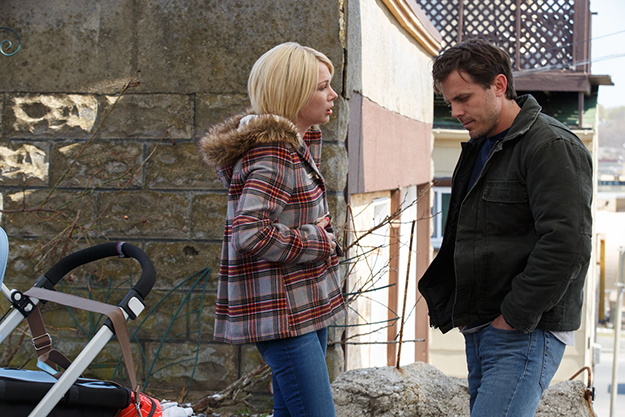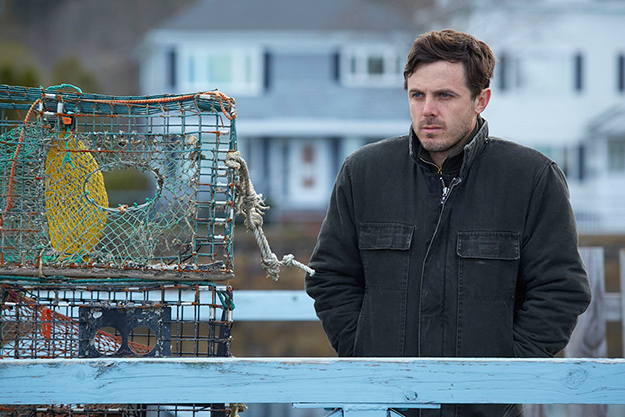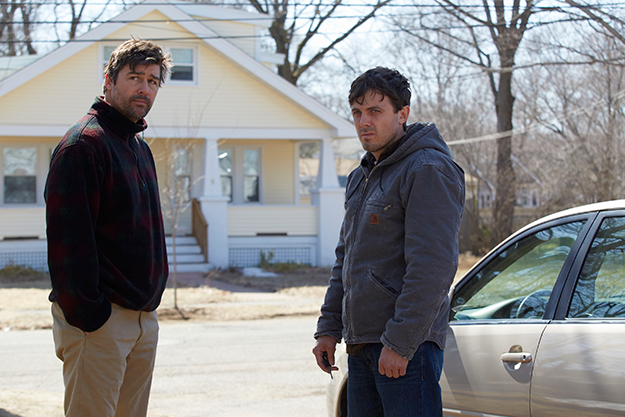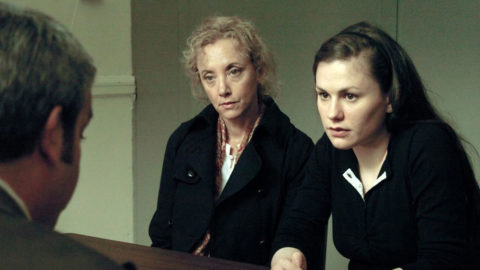Interview: Kenneth Lonergan
After festival screenings at Sundance and in Telluride, Toronto, New York, and London, Manchester by the Sea reaches select theaters on November 18 wrapped in praise. Written and directed by Kenneth Lonergan, the drama focuses on Lee Chandler (Casey Affleck), a handyman suddenly named guardian of his orphaned nephew Patrick (played by Ben O’Brien as a young boy and Lucas Hedges as a teenager).
Set mostly in a blue-collar seaside community in Massachusetts, Manchester by the Sea explores the wary relationship between an underachiever trying to piece his life back together and a typically self-absorbed teenager already familiar with loss. Dragged back to a home he abandoned, Lee is forced to deal with the banality of death—morgues, personal effects, wills, upkeep on a house and boat—while confronting a past he has tried to avoid. Patrick approaches grief by focusing on sports, his rock band, and girls.
Manchester by the Sea has been mentioned so frequently as an awards contender that it risks being overwhelmed by hype. But no matter what you read about it, the movie will still surprise you, in part because of Lonergan’s uncanny knack for finding the inner truth of his characters. His humor and insight are a striking corrective to the cookie-cutter creations and contrived storylines found in many films.
Fighting a cold and admittedly worn-out from talking for months about the project, Lonergan spoke by phone about this and his two previous movies, You Can Count on Me (2000) and Margaret (2011). 
Let’s talk about the scene in which Lee and his estranged wife Randi [Michelle Williams] reconnect on a sidewalk. It’s one of the key moments in the story.
Yeah, it’s the pivotal scene. It’s the first time they really talk about anything since they split up years ago, and it’s the end of his somewhat halting attempts to possibly work himself back into the life there, and it’s the beginning of the end of his attempt to explore the idea of being his nephew’s guardian.
It’s a really important scene. The worry for me was that I was aware it was important, that without that scene working as best it possibly could we wouldn’t have as good of a movie. It’s a very emotional scene, very sad. But it’s also very loving.
We knew we wanted to give it a full half-day, so we had to reschedule it a couple of times. It came near the end of the shoot, which really worked out nicely for all of us. Because I think by that time Casey and Michelle had both been inhabiting the characters for a while and were comfortable with them.
We talked through it as we did with all the scenes, while we were there as well as the night before. So it was pretty easy to do in terms of getting it done. They were both very emotionally available and ready to go. We had two cameras that day, so we just shot it.
You make it sound easy, but it must have been hard for them to sustain those emotions take after take.
It’s a lot easier for me than for them, that’s for sure. I don’t know how they do it, truthfully. I don’t mean to make it sound easy because I think what they have to do is enormously difficult. I have to understand what’s happening in the scene and hope that my thoughts about it will be helpful for them. But they have to live through that and be those people and have those feelings for real even though the circumstances are pretend. But because the two of them are so exceptionally not just talented but professional and skillful, I wasn’t really worried that it wasn’t going to turn out well. I just really wanted it to.
How did you and Casey Affleck reach a consensus about Lee?
I think we had very similar opinions because we went through everything together. We had a really interesting time working everything out. It was somewhat of a unique experience for me and I think for him. He has a million questions, he’s like a relentless detective and wants to know everything he possibly could so that he has a foundation from which to perform a scene. You know he’s bringing everything he has to it by being the guy, and I’m bringing everything I can think of to help him from when I was pretending to be the guy when I was writing it. So I think I have at least one version of the character that is useful for the actor to hear about. But at some point I step back and he has to become the person. And at that point, there’s a whole gang of other things that are Casey’s and Casey’s alone that come into play.
Did Affleck change the character in ways you didn’t expect?
Well all actors do, because they’re all different. They’re never what you imagine because what you imagine is imaginary. I mean if I imagined Casey playing that part… you don’t want that, you want the actors to come in and do things you didn’t expect and say things that you didn’t know.
It’s great when their boundaries and your boundaries of what fits within the story and the circumstances overlap. And it’s really great when you see someone inhabiting that role so fully and still retain all the points that are important to me as well. It’s one thing to write a story, it’s another to act it. That’s why it’s so much fun to work with great actors. They literally bring it to life.

Does Lee expect to be punished for the tragic event that occurs in the story?
I think so, yes.
That happens with characters in your other works as well.
I hadn’t noticed that, but I see what you’re getting at. When Sam in You Can Count on Me asks a minister if she should be punished for having an affair with a married man, she literally says, “Don’t you think it would be better if you told me I was going to burn in hell?” And he says no.
It’s absolutely true that Lisa in Margaret is looking for someone to punish her for what she did. But she’s also looking for some justice for what happened on the bus, for the bus driver. And I think that Casey’s character, Lee, feels responsible in the police station, at least expecting to be put in jail. He definitely blames himself for what happened.
Is it significant that you identify Lee and Patrick as Catholics?
Well, they’re Catholics because that’s what they would be if they lived there. But, I don’t know, if guilt’s a theme, it’s a psychological one, not a religious one. It’s not one that I’m super consciously aware of. I’m not religious at all. I mean I’m interested in religion as a human phenomenon, but I don’t personally ascribe to it. So it’s unlikely that there’s a big element of that behind the film.
Do you feel guilt drives Manchester by the Sea?
It’s not the prime factor. Lee’s also lost his children and his wife. It’s not just that he did something that he feels guilty about, it’s that he has this loss and it’s his fault. You could have a very similar story with someone who was not responsible.
I wouldn’t necessarily assert that guilt in You Can Count on Me was a primary factor either. I think Sam was feeling a little guilty about this and that, but everyone feels guilty about something. I think the main idea of that story is that she’s caught in a quandary of trying to save her brother and protect her son at the same time.
And if you asked me what Margaret is about, guilt would not be anywhere near the top 10 things. Certainly it’s a driving psychological factor, but I wouldn’t say that’s what it’s about. I think it’s about the size of the world and how many different points of view there are. How lost one person’s voice and wishes and feelings can get in such a symphony of voices, thoughts, and feelings, and other people just trying to live their lives.
Now, these stories may all be about my guilt about something, but that’s not what I’m trying to write about. Manchester by the Sea is a little bit more directly about that, certainly. But I could also say it’s just as equally about grief and loyalty and coping and love.
But I definitely tend to write about people who feel guilty. I’ve written a lot of things that tend to circle around the idea of survivor guilt. But that’s completely accidental or completely psychologically driven. You don’t always know what’s behind what you’re writing about, and what’s behind it isn’t always the most interesting thing in it. But those elements are certainly there and common to my work.
For all I know, the psychological wellspring of what makes you write something is not always the same as the content. I think the content’s hopefully just as interesting. I think the psychology has to be consistent with the content, otherwise the piece will have a false ring to it. That’s why I don’t discount the presence and the weight of the guilty feelings the characters have or whatever guilt I may have in describing the films, because it’s obviously a big part of it. But I think it’s one part and I don’t even think it’s the most interesting part.
What I’m really interested in is people struggling with situations that are bigger than they are, that are overwhelming to them. Also the disparity of experience, the variety of human experience, how one person can have one kind of life and his neighbor will have a completely different kind in every respect. That never ceases to fascinate and confound me and also impress me.

Is there any solution to grief?
I don’t think there is, except for time and finding other emotional content in your life as you get older and grow and more time passes between your loss and the present.
You’ve used opera, with its outsized emotions, in your work, and in Manchester by the Sea pieces like the “Pastoral Symphony” from Handel’s Messiah. Can you talk about how music functions in your work?
There’s no opera in this film, but there’s plenty of opera in the extended edition of Margaret, which is the one that counts. For that film particularly, I think the outsized emotions have some correlation with the teenage experience of life, which is a bit outsized.
Also, life does mean that much to people who are living it. When your boyfriend leaves you or your husband leaves you or you die of tuberculosis, it is an opera-sized tragedy. At the same time, it’s a fairly accurate reflection of the human experience. While also being a bit silly.
There’s also a sort of opera theme running through a play I wrote called The Starry Messenger, which touches on the same idea that it’s not wrong to think of your life as a bigger story than it otherwise sometimes feels.
In Manchester by the Sea there’s music from the Messiah, a sonata for oboe and piano, some choral music by Massenet. As well as Lesley Barber’s score. The music pieces are not so much about the human element in the story, but just about the presence of beauty in the world that continues on above us and around us no matter what’s going on. Sometimes in a way that feels indifferent, and sometimes in a way that feels very sustaining and warming.
Was this a difficult shoot overall?
Just the usual pressure. Any film shoot is pressurized because there’s a lot to do in a limited amount of time and with a limited amount of money. We were under-scheduled from the beginning—it probably would have been better if we’d gotten that all figured out before we started. It became a sort of day-by-day process, but it ended up working out all right. We ended up extending I think four days. It’s not like we were doing a million setups per scene. We were doing one or two, we’re not very extravagant.
What the pressure does is make you concentrate despite the swarm of activity and despite whatever the problems of the day happen to be. It’s very difficult. Fortunately the creative problems of the day are front and center, so they draw your attention away from all the other stuff. And then you go home and worry, oh my God, we don’t have enough time, we’ll never make it, etc.
At this stage I tend to see all the things that I don’t like, that I wish I could have done a little better. But we worked very hard and I’m very happy with it.
Daniel Eagan is a critic and film historian living in New York City. He is currently working on the third volume of America’s Film Legacy, a survey of the National Film Registry.





